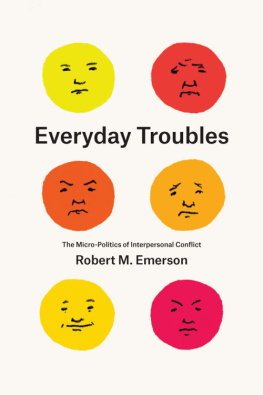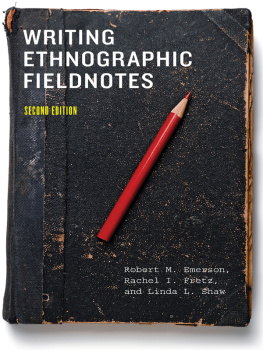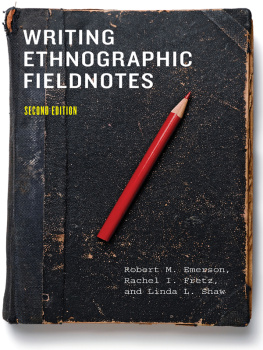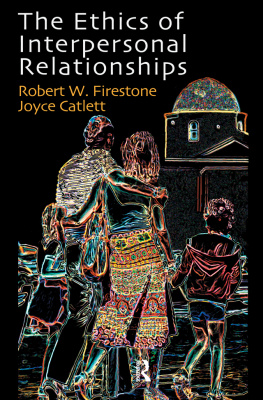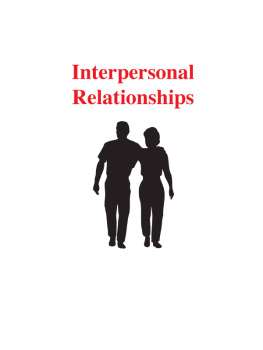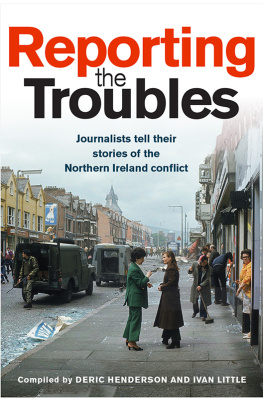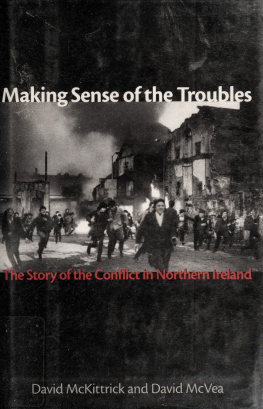Everyday Troubles
The Micro-Politics of Interpersonal Conflict
ROBERT M. EMERSON
The University of Chicago Press
Chicago and London
Robert M. Emerson is professor emeritus in the Department of Sociology, at the University of California, Los Angeles.
The University of Chicago Press, Chicago 60637
The University of Chicago Press, Ltd., London
2015 by The University of Chicago
All rights reserved. Published 2015.
Printed in the United States of America
24 23 22 21 20 19 18 17 16 15 1 2 3 4 5
ISBN-13: 978-0-226-23780-0 (cloth)
ISBN-13: 978-0-226-23794-7 (paper)
ISBN-13: 978-0-226-23813-5 (e-book)
DOI: 10.7208/chicago/9780226238135.001.0001
Library of Congress Cataloging-in-Publication Data
Emerson, Robert M., author.
Everyday troubles : the micro-politics of interpersonal conflict / Robert M. Emerson.
pages cm
Includes bibliographical references and index.
ISBN 978-0-226-23780-0 (cloth : alk. paper) ISBN 978-0-226-23794-7 (pbk. : alk. paper) ISBN 978-0-226-23813-5 (e-book) 1. Interpersonal conflict. 2. Social conflict. 3. Interpersonal relations. I. Title.
HM1121.E564 2015
302dc23
2014038548
This paper meets the requirements of ANSI/NISO Z39.481992 (Permanence of Paper).
The Lone Ranger and Tonto
theyre riding down the line,
fixing everybodys troubles,
everybodys except mine.
Someone must of told them
that I was doing fine.
Bob Dylans Blues
Contents
Bob Emersons approach to troubles has its origins in the Sixties, that protean and misleadingly labeled era which erupted from stirrings in the 1950s and continued to launch new lines of thought long into the 1970s. Everyday troubles is not an unusual focus for a sociological study today but it would have seemed an odd book title earlier in sociologys history. Like Howard S. Becker and his insufficiently appreciated mentor, Everett Hughes, Emerson honors simplicity in writing style. His texts are eminently accessible and modest to a fault. It takes a bit of explanation to convey just how true to the sixties, how radical this book is.
A few notes on the authors intellectual biography are essential. When Hughes left Chicago and resumed his teaching career at Brandeis between 1962 and 1967, he became central to Emersons development as a sociologist. Another powerful influence was Egon Bittner. Although he came to Brandeis after Emerson left, Bittner read Emersons dissertation and through their interactions became a window onto Harold Garfinkels work, which was then a cultish, for most readers impenetrable, to many established sociologists infuriating, and for young sociologists a truly dangerous rebeginning of sociological theory that would alienate many from established and viable academic career paths. Bittner had trained at UCLA, as had Aaron Cicourel and John Kitsuse, all of whom were powerfully influenced by Garfinkel, who began teaching at UCLA in 1954. (In that larger project of intellectual history, the supposedly conservative Eisenhower years would be appreciated as the gestation period of what only became universally visible in the anti-Establishment 1960s.)
After Brandeis, Bob took a postdoc at the Law and Society Center, an exciting new center for qualitative sociologists at the University of CaliforniaBerkeley. Erving Goffman was then on the Berkeley faculty. Perhaps because of their common if generation-separated past as students of Hughes and their shared ongoing research interests in the official treatment of juvenile delinquents and the mentally ill, and via the intermediation of Sheldon Messinger, among other intermediaries, Goffman became a mentor to Bob, reading and discussing parts of his dissertation in detail, then commenting on Bobs work through correspondence that was sustained after Bob started his faculty career at UCLA and Goffman moved to the University of Pennsylvania.
Another window onto the same stream of emerging social thought was through Bobs sister, Joan, who was a PhD student at Berkeley in the 1960s. Joan studied alongside Harvey Sacks and Emanuel Schegloff and was sponsored in part of her work by Garfinkel. The protean nature of the times is indicated by the many ways that Garfinkels influence flowed independent of classrooms, PhD committee composition, and institutional boundaries. It is fitting that it would require a creative ethnographic research project to trace this intellectual movement.
Through his forty-year career at UCLA, Emerson lived within an ecology of Sixties-era social thought. Continuous influences traceable to Hughes, Garfinkel, and their students were kept vivid by Emersons departmental colleagues, Schegloff, Garfinkel, later myself (conveying influences from Becker and Kitsuse), John Heritage, and Steve Clayman. Most important was his frequent coauthor, Mel Pollner, a joyful and witty intellect who often seemed to have floated into sociology out of a Chagall painting.
Emersons work became a blend of micro-sociological traditions. The terms often used in US academic sociology for referencing these traditions, Chicago school fieldwork, symbolic interactionism, and ethnomethodology, will seem odd to nonspecialists, and they should. The central ideas are rooted in American pragmatism and European phenomenology, two philosophical traditions whose similar honoring of both an active human subject and of the scientific method as an arbiter of competing ideas was recognized by and stimulating to early twentieth-century contributors. That these traditions should be blended in academic sociology would, to an outsider, seem inevitable. But due to the machinations of academic power, young researchers were pressed to affiliate with exclusive research camps.
If the Sixties was a period of striking intellectual independence, it was also one in which the self-serving constraints of disciplinary boundaries were being institutionalized in new forms. Academic sociologists then and now emphasize, even rigidify, their differences, for strong if not good reasons. As time goes on and literatures mount, there is an ever greater concern to limit what one needs to read. Departmental faculties differentiate subtypes of sociology when they make hiring claims for open faculty positions; specialization limits competing candidates and intercollegial conflict. Among late twentieth-century academics, social networks that distanced themselves from each other became widely useful for stimulating in-group loyalties and excluding unsympathetic peer reviewers of journal articles, book manuscripts, and research grant applications.
Emerson refused to choose, through some combination of factorswisdom, a deeply independent mind (his father, a Yale law professor, was perhaps the leading First Amendment legal scholar in the US; Bob grew up listening for telltale FBI wiretapping clicks on the home phone), and an aversion to conflict. His independence was rare. (For a while, David Sudnow also kept feet in both camps, only to abandon academia entirely at midcareer. Murray Daviss aborted career at UCSan Diego also showed the difficulty of straddling interactionist and ethnomethodological camps.) One unfortunate upshot of the split between pragmatist and phenomenologically rooted sociology is the lack of a common rhetoric for addressing fundamental issues. As a product of Emersons stubborn open-mindedness, Everyday Troubles invites an attempt to explicate a shared methodology.
Readers of this book may wonder how to read statements which assert that at a given stage of a troubled relationship, the aggrieved party may take a particular course of action. Why mention a particular course of behavior if others unmentioned might have been taken? Did the actor face any constraints on alternatives? If so, why not describe them? If not, do the instances reported constitute an arbitrary collection from the relevant set? And if all of the analyzed actions might or might not have occurred, in what sense does the social life of troubles have stages? Whence the patterning of the social life of troubles?

